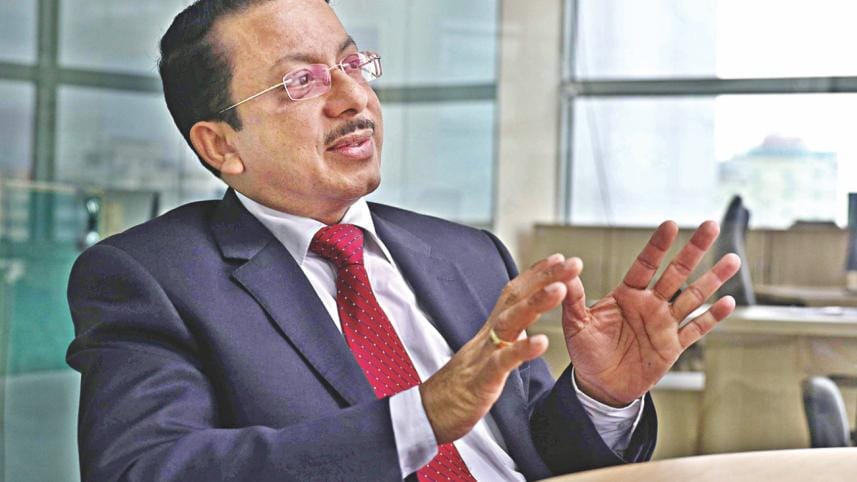Creating excellence in healthcare

Hailing from Bangalore, R. Basil is an Electrical Engineering graduate from the College of Engineering, Trivandrum who did his M. Tech in Power Systems Engineering from Cochin University of Science & Technology. Since then he has worked in three different sectors — Power Systems Engineering, Medical Systems and Healthcare Management.
Before joining STS Holdings Ltd., Bangladesh, the parent company of Apollo Hospitals Dhaka as its Executive Director and CEO, he held various senior leadership positions such as Vice-President of Wipro-GE Medical Systems, Managing Director and CEO of the Manipal Hospitals Group and Executive President of Apollo Hospitals Group of India.
Some of the pioneering initiatives which Basil introduced back in 2002 have become an integral part of the healthcare industry's evolving standards in ensuring quality. Recently he shared some of his views with The Daily Star.
The interview was taken by Amitava Kar.
How did you get into healthcare?
I worked for a power systems company for the first 12 years of my career. Afterwards, I had an opportunity to work for General Electric — Wipro-GE Medical Systems where I held several positions including Head of Business Processes, eventually becoming the Vice President of the company. I was living in Bangalore then. One day I had to take my little kid to a hospital. The service was so poor that I promised never to go back there again. Two years later, the owners of that hospital came to me seeking my help in transforming their institution. These were people well known for their medical education programmes. Hospitals were part of their medical colleges. But they did not know how to run stand-alone hospitals. Initially reluctant, I looked at it as a leadership opportunity. Over the years I have become passionate about it. I can touch lives.
How would you reflect on your time in Dhaka?
Healthcare has a tremendous opportunity here. Many Bangladeshis go abroad for medical treatment. It seems that they do not have good trust in local hospitals. Private hospitals are expensive. I started benchmarking and identifying the gaps. I focused on 3 parameters: clinical excellence, friendliness to patients and transparency and ethical practice.
For example, a patient is given an estimate of how much a surgery will cost. At the end of the day the bill could be more than what was promised. That creates dissatisfaction in the mind of the patient. So we created package prices and told the staff that for no reason could the final bill be more than that. If it is, we should absorb it. We also started offering the most complex surgeries for which a lot of patients are going abroad. The result was amazing. Our patient volume went up.
What are the main challenges that private hospitals face in Bangladesh?
The first is the lack of clinical talents. People want to invest in hospitals. But how do you get good doctors? The medical colleges will have to have more seats for postgraduate studies. Public and private medical colleges have to enhance the quality of their curricula. Students should have global exposure. We should produce efficient paramedical staff — lab technicians, X-ray technicians and nurses. And then there is the issue of management. The organisational culture should be such that the management team should be given enough professional space to make tough decisions.
Why is treatment so expensive in private hospitals?
It is a great challenge to run a capital-intensive hospital profitably. The capital expenditure is very high. An MRI machine costs 30-40% higher here than in India due to duty and taxes. The manpower is also expensive as some hospitals bring in doctors and nurses from abroad. In order to reduce costs, hospitals must create higher volumes. And for that hospitals should focus on clinical excellence, patient friendliness and transparency and ethical practices because trust matters.
Why do patients have to undergo so many tests?
It is the duty of a doctor or whoever is dealing with a patient to explain clearly at every step what they are doing and why they are doing it. That builds credibility. Oftentimes, doctors do not spend time with patients. That is why there may be a feeling of apprehension among the patients. They may feel like hospitals are out there just to make money. It is all because there was not proper communication. We train junior doctors how to communicate, what to communicate, how to break the bad news.
What leads to wrong diagnosis?
Before you release a report, you are supposed to give the sample to another referral centre for a second opinion. This is part of the process. Chances of error come down when more than one person is involved. Now imagine a hospital that has no such standardisation in place.
What is the way forward?
A lot more hospitals and doctors are needed. Life expectancy has gone up significantly. Geriatrics has not really grown as a sub-specialty in Bangladesh. People should have health insurance. The government can come on board with a strong but friendly insurance policy. IT systems should be robust. The management of insurance largely depends on a powerful IT structure.
Hospitals have to go for standardisation. There are several processes. Once you follow them, you have an institutional process. It is based on defined clinical pathways and protocols. It is not left to a few individuals to do certain things according to their will.

 For all latest news, follow The Daily Star's Google News channel.
For all latest news, follow The Daily Star's Google News channel.
Comments